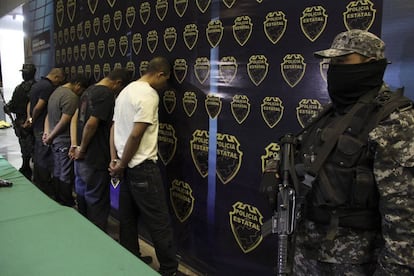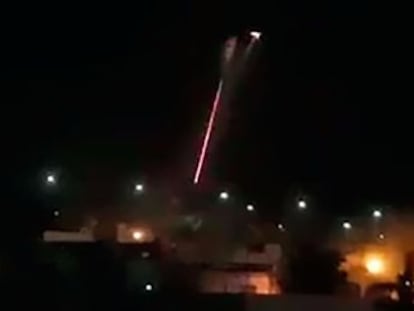Mexico¡¯s Jalisco drug cartel uses Facebook to recruit new hitmen
Group posted false job ads on social media platform then forced applicants to attend training camps
Authorities in the central Mexican state of Jalisco say that the Jalisco Nueva Generaci¨®n (CJNG) drug cartel has been posting fake jobs on Facebook and then forcing recruits to take part in gang training camps against their will.

The cartel ¨C Mexico¡¯s most powerful ¨C allegedly placed false advertisements for positions including bodyguards, security guards, pollsters and even local police officers on the social media platform. Once people were recruited, they were taken to the town of Tala, about an hour from the state capital Guadalajara, where they were given weapons and self-defense training.
The cartel¡¯s scheme, which targeted applicants aged 16 to 35, was revealed by state prosecutor Eduardo Almaguer Ram¨ªrez during a recent press conference. He said details had come to light after one recruit had managed to escape a training camp where he was being held against his will, before guiding authorities back to its location. The man said that around 50 criminals were guarding 40 trainees.
Some 200 people have disappeared in the Tala area since 2013, according to local media
In a July 21 raid on the camp headed by the prosecutor¡¯s office, police only managed to rescue two recruits as the rest of the group had already moved on. They soon found a second camp containing human remains.
Prosecutors have now identified at least five such camps, after a further three were discovered in an operation involving 400 police officers and soldiers. Their discovery comes in the wake of around six complaints received by prosecutors in June filed by family members looking for missing relatives. All those cases were similar: the missing persons had been offered a job and told they were required to attend a training camp.
Six missing people have now been found and rescued.
State prosecutor Almaguer said his office would now investigate whether police in Tala had been implicated in the scheme, noting it was suspicious that local law enforcement had failed to notice the presence of the camps and the movement of supplies and food necessary for such a large number of people.
According to local media outlets, some 200 people have disappeared in the Tala area since 2013.
In one operation, authorities found a training camp containing human remains
This is not the first time that the CJNG, headed by Nemesio Oseguera Cervantes, has resorted to unusual recruiting methods. In March 2016, authorities said the cartel had set up a ¡°ghost¡± business named Segmex to entrap people. The group distributed fliers advertising security jobs in the districts of Tlaquepaque and Puerto Vallarta and then forced possible recruits to attend training at a country estate.
The CJNG has cemented its place as the most powerful organized crime group in Mexico in little more than four years, taking advantage of the power vacuum created in the Sinaloa cartel since former boss Joaqu¨ªn El Chapo Guzm¨¢n was extradited to the United States. The rival Zetas and Knights Templar drug cartels have also been weakened by territorial wars.
According to security expert Gerardo Rodr¨ªguez S¨¢nchez-Lara, the CJNG have also achieved rapid expansion by colluding with local authorities in areas where they operate. They are also incredibly violent.
¡°They have brutally slayed state police in Jalisco, while using sadistic and violent means against security forces and attacking Mexican army targets, including shooting down military helicopters to expand their territory,¡± the expert told EL PA?S in May.
English version by George Mills.
Tu suscripci¨®n se est¨¢ usando en otro dispositivo
?Quieres a?adir otro usuario a tu suscripci¨®n?
Si contin¨²as leyendo en este dispositivo, no se podr¨¢ leer en el otro.
FlechaTu suscripci¨®n se est¨¢ usando en otro dispositivo y solo puedes acceder a EL PA?S desde un dispositivo a la vez.
Si quieres compartir tu cuenta, cambia tu suscripci¨®n a la modalidad Premium, as¨ª podr¨¢s a?adir otro usuario. Cada uno acceder¨¢ con su propia cuenta de email, lo que os permitir¨¢ personalizar vuestra experiencia en EL PA?S.
En el caso de no saber qui¨¦n est¨¢ usando tu cuenta, te recomendamos cambiar tu contrase?a aqu¨ª.
Si decides continuar compartiendo tu cuenta, este mensaje se mostrar¨¢ en tu dispositivo y en el de la otra persona que est¨¢ usando tu cuenta de forma indefinida, afectando a tu experiencia de lectura. Puedes consultar aqu¨ª los t¨¦rminos y condiciones de la suscripci¨®n digital.










































